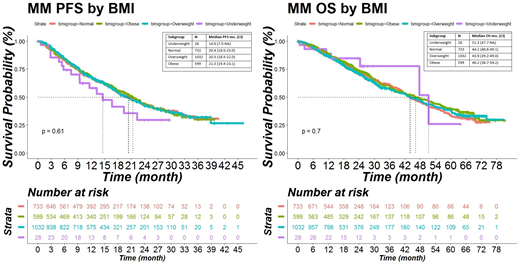Background: Obesity has been implicated as a risk factor for the development of certain types of cancers, including multiple myeloma (Wallin 2011). In a report published in NEJM in 2016, the relative risk of multiple myeloma for overweight to class 1 obese individuals was 1.2, versus a relative risk of 1.5 for class 2 to 3 obese individuals (Lauby-Secretan 2016). Recent reports indicate that BMI may impact prognosis in patients with newly diagnosed multiple myeloma (Beason 2013). Minimal information is available on impact of BMI and prognosis in patients with relapsed-refractory multiple myeloma.
We analyzed the association between BMI and clinical outcomes in patients with relapsed/refractory multiple myeloma to determine if there is a difference in outcomes based on body weight.
Methods: We conducted a retrospective analysis of four clinical trials evaluating novel therapeutics. These trials enrolled patients with relapsed/refractory multiple myeloma who had received one or more prior therapies. Patients were categorized into four groups, underweight (BMI <18.5 kg/m2), normal weight (BMI 18.5-24.9 kg/m2), overweight (BMI 25.0-29.9 kg/m2) and obese (BMI >30.0 kg/m2). The Kaplan-Meier method was used to estimate progression free survival and overall survival.
Results: A total of 2392 subjects were included in this analysis. The median age was 65 years (range 30-91 years). A total of 28 (1.2%) subjects were underweight, 733 (30.6%) were normal weight, 1032 (43.1%) were overweight, and 599 (25.0%) were obese. More of the underweight subjects were female (82.1%), whereas more of the overweight and obese subjects were male (62.9% and 56.6%, respectively). The median PFS and OS K-M curves are displayed below. In this univariate analysis, there were no differences in PFS (p=0.61) or OS (p=0.7) among the four groups. There were some differences in the underweight population; however, the small sample size of this group precludes any meaningful conclusions. Univariate analyses by gender did not reveal any differences in outcomes based on body weight.
Conclusion: In patients with relapsed/refractory multiple myeloma, body weight had no impact on outcomes, as measured by PFS and OS. These results are consistent with previous findings on the effect of BMI on survival in subjects with multiple myeloma after autologous stem cell transplant (Kocoglu 2018). Limitations of this analysis include the use of a univariate analysis, the small sample size for patients who were underweight, heterogeneity in the treatment regimens, and immaturity of the OS data. Future studies are needed to evaluate other variables such as the relationship between cytogenetics and body weight, as well as analyses of safety based on body weight in this relapsed/refractory patient population.
Shah:Physicians' Education Resource: Honoraria. Mailankody:Juno: Research Funding; Celgene: Research Funding; Janssen: Research Funding; Takeda Oncology: Research Funding; CME activity by Physician Education Resource: Honoraria. Landgren:Sanofi: Membership on an entity's Board of Directors or advisory committees; Karyopharm: Membership on an entity's Board of Directors or advisory committees; Amgen: Honoraria, Membership on an entity's Board of Directors or advisory committees, Research Funding; Abbvie: Membership on an entity's Board of Directors or advisory committees; Merck: Other: IDMC; Theradex: Other: IDMC; Celgene: Honoraria, Membership on an entity's Board of Directors or advisory committees, Research Funding; Adaptive: Honoraria, Membership on an entity's Board of Directors or advisory committees; Janssen: Honoraria, Membership on an entity's Board of Directors or advisory committees, Research Funding; Takeda: Honoraria, Membership on an entity's Board of Directors or advisory committees, Research Funding.
Author notes
Asterisk with author names denotes non-ASH members.


This feature is available to Subscribers Only
Sign In or Create an Account Close Modal